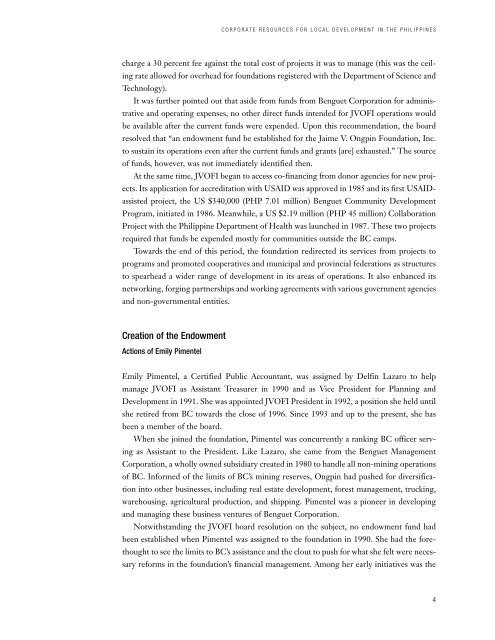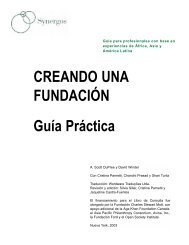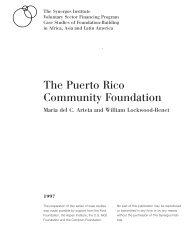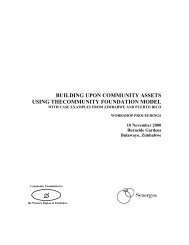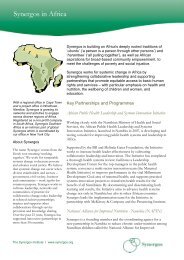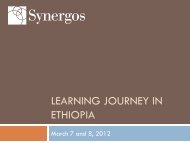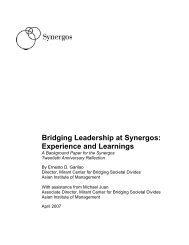Download full text of paper (PDF) - Synergos
Download full text of paper (PDF) - Synergos
Download full text of paper (PDF) - Synergos
Create successful ePaper yourself
Turn your PDF publications into a flip-book with our unique Google optimized e-Paper software.
CORPORATE RESOURCES FOR LOCAL DEVELOPMENT IN THE PHILIPPINES<br />
charge a 30 percent fee against the total cost <strong>of</strong> projects it was to manage (this was the ceiling<br />
rate allowed for overhead for foundations registered with the Department <strong>of</strong> Science and<br />
Technology).<br />
It was further pointed out that aside from funds from Benguet Corporation for administrative<br />
and operating expenses, no other direct funds intended for JVOFI operations would<br />
be available after the current funds were expended. Upon this recommendation, the board<br />
resolved that “an endowment fund be established for the Jaime V. Ongpin Foundation, Inc.<br />
to sustain its operations even after the current funds and grants [are] exhausted.” The source<br />
<strong>of</strong> funds, however, was not immediately identified then.<br />
At the same time, JVOFI began to access co-financing from donor agencies for new projects.<br />
Its application for accreditation with USAID was approved in 1985 and its first USAIDassisted<br />
project, the US $340,000 (PHP 7.01 million) Benguet Community Development<br />
Program, initiated in 1986. Meanwhile, a US $2.19 million (PHP 45 million) Collaboration<br />
Project with the Philippine Department <strong>of</strong> Health was launched in 1987. These two projects<br />
required that funds be expended mostly for communities outside the BC camps.<br />
Towards the end <strong>of</strong> this period, the foundation redirected its services from projects to<br />
programs and promoted cooperatives and municipal and provincial federations as structures<br />
to spearhead a wider range <strong>of</strong> development in its areas <strong>of</strong> operations. It also enhanced its<br />
networking, forging partnerships and working agreements with various government agencies<br />
and non-governmental entities.<br />
Creation <strong>of</strong> the Endowment<br />
Actions <strong>of</strong> Emily Pimentel<br />
Emily Pimentel, a Certified Public Accountant, was assigned by Delfin Lazaro to help<br />
manage JVOFI as Assistant Treasurer in 1990 and as Vice President for Planning and<br />
Development in 1991. She was appointed JVOFI President in 1992, a position she held until<br />
she retired from BC towards the close <strong>of</strong> 1996. Since 1993 and up to the present, she has<br />
been a member <strong>of</strong> the board.<br />
When she joined the foundation, Pimentel was concurrently a ranking BC <strong>of</strong>ficer serving<br />
as Assistant to the President. Like Lazaro, she came from the Benguet Management<br />
Corporation, a wholly owned subsidiary created in 1980 to handle all non-mining operations<br />
<strong>of</strong> BC. Informed <strong>of</strong> the limits <strong>of</strong> BC’s mining reserves, Ongpin had pushed for diversification<br />
into other businesses, including real estate development, forest management, trucking,<br />
warehousing, agricultural production, and shipping. Pimentel was a pioneer in developing<br />
and managing these business ventures <strong>of</strong> Benguet Corporation.<br />
Notwithstanding the JVOFI board resolution on the subject, no endowment fund had<br />
been established when Pimentel was assigned to the foundation in 1990. She had the forethought<br />
to see the limits to BC’s assistance and the clout to push for what she felt were necessary<br />
reforms in the foundation’s financial management. Among her early initiatives was the<br />
4


